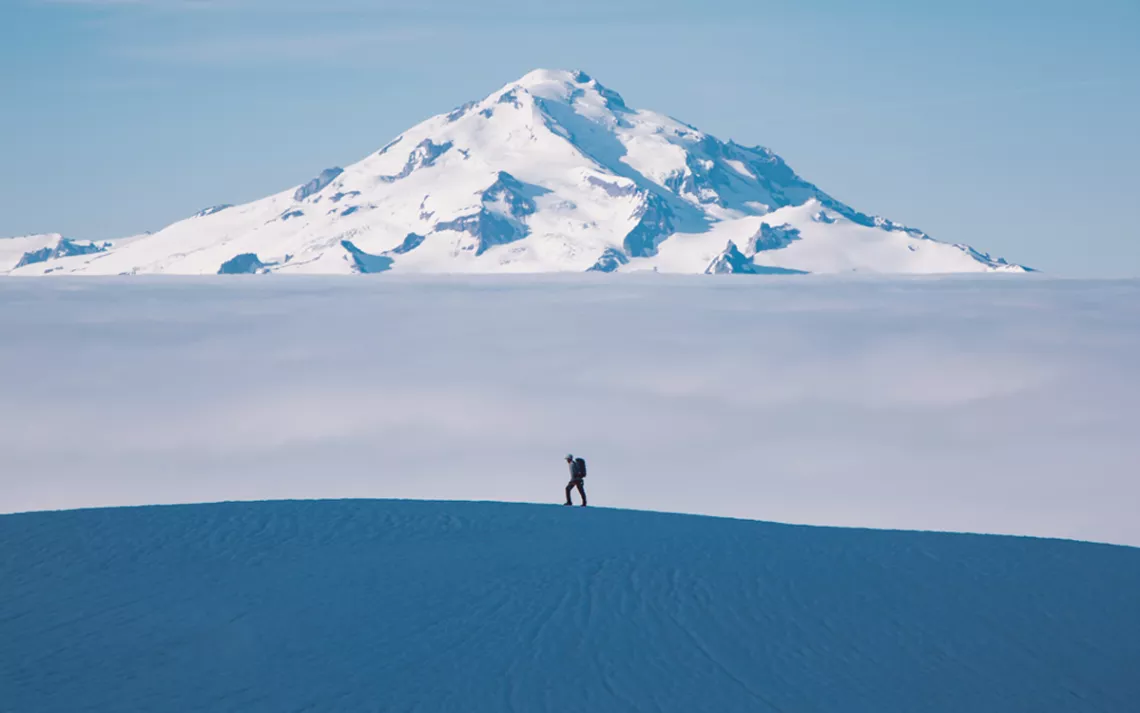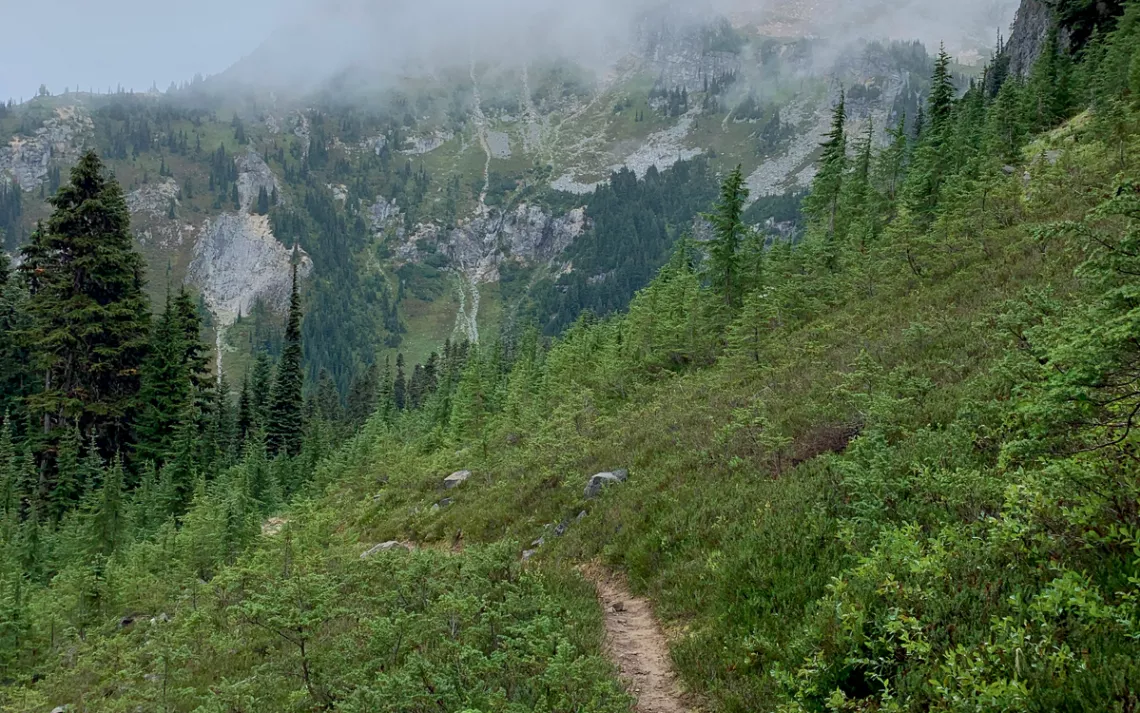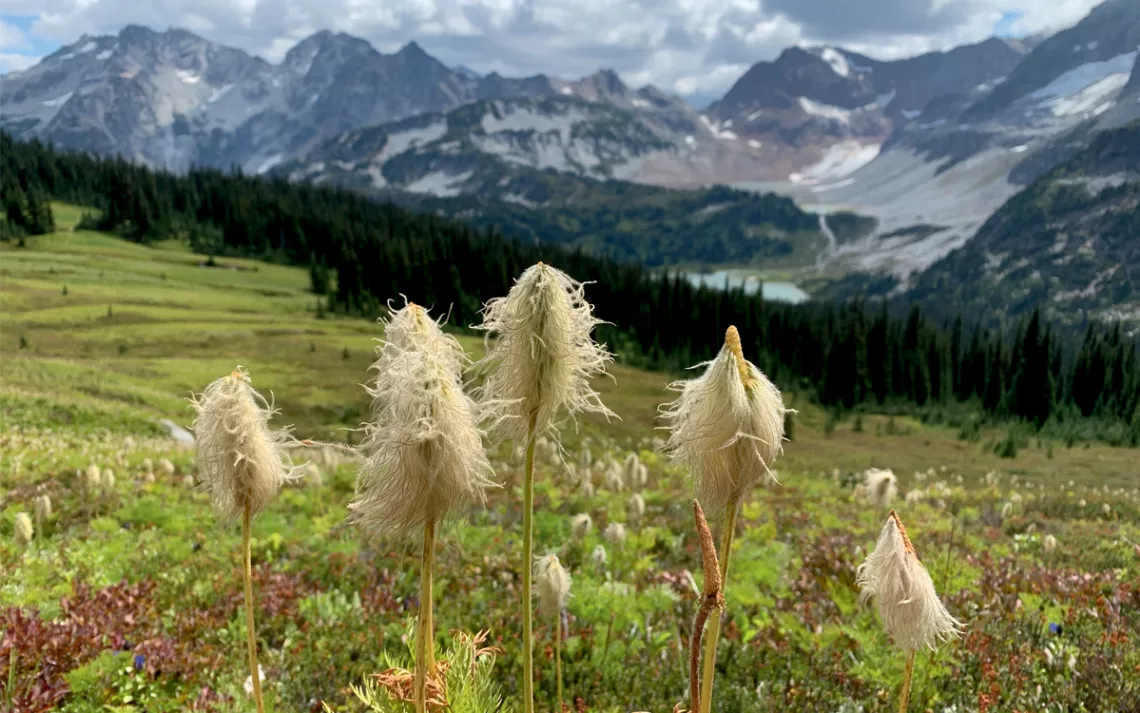The Science of Solo Time in the Wilderness
A writer unpacks the latest findings on solitude and the outdoors

Washington State's Glacier Peak, or Tda-ko-buh-ba in the Lushootseed language. | Photo by Mitch Pittman/Tandem Stills + Motion
I woke up to a relentless pitter-patter on my tent—not what the weather report had predicted. I was 14 miles into a 44-mile loop in the eastern shadow of Washington's Glacier Peak, and my rain setup wasn't great. My first thought: Turn back.
The drizzle turned to sleet and then reverted back to drizzle. Permutations of how miserable I might be for the next few days ran through my mind. I decided to continue anyway. Growth doesn't happen, I reminded myself, if we stick to only what's comfortable.
As a child, I was taught that it was cool to experience nature, but only in moderation. My mom viewed camping with disdain—she and my dad didn't immigrate to the United States and work so hard in order to pull a tarp over their heads and sleep on the ground. But my longing for wild, quiet spaces was too strong to ignore, and shortly after I moved to Washington, I began backpacking by myself.
When I tell people about my solo adventures in the wilderness, I'm met with either "you're crazy!" or "you're brave!" I'm not the only woman—or person of color—to have to navigate these responses, and I'm not downplaying the safety issues. But I know that the risks are outweighed by the benefits I receive from those days alone in the woods.
When solitude engulfs me in the backcountry, I give myself fully to what the trail demands. There is no chatter, no pinging from my cellphone, nobody to help me make decisions. The terrain is my stimuli, my body the gauge, and my mind the sensor. When the trail tires my body, it's a sign to rest or eat. When there's water, I drink. When the path is unencumbered by rocks and roots, I give my mind permission to coast. I feel anxiety dissipate when I'm by myself in the woods.

A trail through the North Cascades | Photo by Wudan Yan
Of course, some of this may seem obvious. There's a long tradition of poets, prophets, and mystics seeking enlightenment from solitude in the wild. Indigenous cultures use such experiences as rites of passage. In recent years, researchers have confirmed the wisdom that solo time in nature can be beneficial. A review of the literature on solitary wilderness experiences, published in Frontiers of Psychology, concluded that voluntary solitude in the outdoors is "linked to profound personal outcomes, including the discovery of new and expansive ways of knowing the self and the world."

An alpine meadow dotted with white pasqueflower | Photo by Wudan Yan
But why? What, precisely, is it about solitude in the wilderness that sparks an expansion of self?
Robert Coplan, a psychologist at Carleton University in Canada who studies the effects of solitude, admits that the science remains "fuzzy." Researchers know that time in nature—whether in a group or alone—has measurable benefits. It reduces stress and improves cognition, and puts people in a better mood overall. Hiking and backpacking, like any physical exercise, release endorphins and boost feelings of well-being. "When you are in nature, the pace of everything that you see slows down," Coplan says. "Just being outside" lowers one's heart rate and blood pressure and reduces levels of cortisol, the stress hormone.
Researchers also know that voluntary solitude (as opposed to loneliness and social isolation) can be beneficial. Practices like mindfulness meditation have many of the same positive effects as being outdoors: reduced stress, boosts in memory, and improvements in self-esteem. But how do time in nature and solitude combine to create an experience that may be greater than the sum of its parts? "Those are some of the mechanisms we're still trying to figure out," Coplan says.
Evi Petersen, a graduate student at the University of South-Eastern Norway who researches the effects of solo time in nature, says that a variety of factors can influence an individual's experience. A person's gender, cultural heritage, and personality can all play a role, as can the type of landscape they're in, the weather, and the duration of their trip. A first-time solo backpacker, for example, may be too far outside their comfort zone to be overtaken by peace and calm. Others may overcome their fears and, in Petersen's words, "emancipate" themselves. "The soul is such a compact and complex experience, which has so many different layers to it, that I have not come across one theory that could comprehend all the mechanisms [of solitude in nature] in a simple way."
Petersen's mention of "the soul" reveals the core challenge of studying solitude in nature: A subjective experience like a solo trip into the wilderness relies on subjective measurements, which are prone to bias and self-confirmation error. But this very subjectivity—the soul alone with the self—may perhaps suggest an answer as to why solitude in the wilderness can be so life-changing. Petersen notes that, as social beings, humans are "trained to relate to something." Alone in the wilderness, "we open up for a relationship with our environment." The only thing to relate to is the natural world all around you.
On my rain-shadowed trek, I felt this reorientation of relationships. I was only responsible for managing my own experience and was completely free from the expectations of others. As I climbed over Buck Creek Pass, Glacier Peak—a.k.a. Dakobed, or Tda-ko-buh-ba in the Indigenous Lushootseed language—emerged from the clouds, and I screamed with joy. There was no one to hear my loud whoop; I felt a wave of pent-up energy release. Of the things I enjoy about solo trekking, I find such moments the most freeing of all. Alone in the wilderness, you can dance like nobody's watching and scream like nobody's listening.
The remainder of the trip was a mix of trials and rewards. Accompanied by only the shrill whistle of marmots, I passed through meadows dotted with white, Seussian tufts of bear grass and skirted pothole lakes laid out like turquoise beads on a necklace. But in the evenings, it fell below freezing—which was enough for me to quicken my pace and cut my trip by a day.
During the final miles, I entered a kind of flow state, and it felt effortless as I cruised along the winding trail. It was as if the few days alone in the backcountry had dislodged a heavy weight that was inside me. I don't know whether it was the effects of the digital detox, or the rush of endorphins from the exercise, or having braved two unpleasant nights, but I felt a deep sense of ease. As a science journalist, I wanted to know the cause of that feeling. The effect, though, was all the proof I needed to know it was real.
This article appeared in the Summer 2022 quarterly edition with the headline "Solo Time."
Take a Sierra Club trip to North Cascades National Park. For details, see sc.org/outings.
 Go It Alone
Go It Alone
Sleeping in the backcountry alone may sound like an intimidating endeavor. Here are ways to ease into it so it becomes a pleasurable, not stressful, experience.
Learn navigation skills and have a way to track where you are going
The Gaia GPS phone app tracks your progress on a trail (so you can retrace your steps if necessary). A satellite messaging device, such as Garmin inReach, can track your GPS coordinates, send messages to your emergency contacts, or call for search-and-rescue. Learn how to orienteer with a compass and a map; most REI stores offer basic classes.
Start with the familiar, then venture farther
Build your confidence on trails that you've previously visited. Then pick an overnight destination that is close to a road or gets cellphone reception. Check the weather, trail conditions, and air quality before you go. Tell a friend or family member where the trailhead is and when you expect to return home.
Don't be swayed by others' fears
Some people's concerns about traveling solo in the backcountry say more about them than they do about you. If you think through your preparedness and emergency plans, you should be OK.
 The Magazine of The Sierra Club
The Magazine of The Sierra Club






